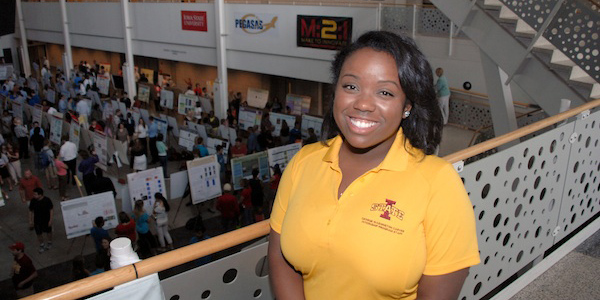
Sharing The George Washington Carver Experience
This summer Celize Christy helped students from across the United States follow in the footsteps of George Washington Carver as they explored agricultural science in research labs at Iowa State University.
For eight weeks Christy, a native of Dallas, worked with Theressa Cooper, College of Agriculture and Life Sciences assistant dean for diversity, to coordinate the program.
“I was asked to assist with the programand it fit with what I wanted to do,” Christy says. “It was fun to watch these young adults learn together and connect as friends.”
Christy says she was looking for a professional position for the summer and Dean Wendy Wintersteen helped connect Christy with Cooper.
“She is so personable and offered valuable guidance,” Christy says of Cooper. “She shared her experiences and helped me move ahead and grow.”
As the coordinator for the George Washington Carver Internship Program, Christy, a junior in animal science, helped manage 13 high school and 22 college students. The program, which is sponsored by the College of Agriculture and Life Sciences, introduces students to various areas of research. Seven of the students are part of the Science Bound program at Iowa State that recently received a grant from DuPont Pioneer. Cooper says Christy was a valuable asset this summer.
“She was engaging, pleasant and humorous, which helped the interns feel like they were part of the Iowa State community,” Cooper says.
Careers in science, technology, engineering and mathematics (STEM) will increase 17 percent through 2018 according to the U.S. Department of Commerce. Cooper says the internship program bridges the gap between access and opportunity for multicultural populations.
The 2013 summer class was the second largest class of interns since the program started in 1997. The students were mainly from Iowa, but also included students from Puerto Rico, Texas, Illinois and Alabama. Since the start of the program faculty have mentored more than 300 interns.
From getting nightly updates about their daily experiences to hosting students at a barbecue, Christy says coordinating the program was an eye-opening experience.
“Some of the students were in programs they hadn’t thought about exploring and it opened their eyes,” Christy says. “Three students had just graduated and decided to go to Iowa State to pursue their master’s degree because of this experience.”
For Ellen Tisdale the internship provided more than a summer experience. Tisdale, who is now a graduate student with a research assistantship in genetics, says she was introduced to a caring community that encouraged her to pursue a graduate degree.
“When I got to Iowa State, I met some extremely wonderful and helpful people,” the interns in any way possible and often went out of her way to make sure we were ok.”
While she was introducing interns to campus, Christy says she also was learning more about the college.
“I met several professors and mentors and I learned from them about how they successfully pursued their careers,” Christy says.
Next summer Christy plans to study abroad and has applied for the college’s Service Learning Program in Uganda. She has been accepted into the Agricultural and Life Sciences student ambassador program. She hopes to work in international rural development after she graduates.
Celebrating 150 Years Of George Washington Carver’s Legacy
Although the exact year and date of George Washington Carver’s birth is unknown, most historians believe he was most likely born in 1864. That’s 150 years worth celebrating.
In 2014, the College of Agriculture and Life Sciences will honor Carver for his many scientific discoveries, achievements and his contributions to the social justice and civil rights movements. “Celebrating the Life and Legacy of George Washington Carver” events during the year will include a lecture series, seminars, student research opportunities, food tastings, displays and artistic performances.
Carver was the first African American to enroll at Iowa State in 1891. He received his bachelor’s degree in 1894, his master’s in 1896 and then became the first African American faculty member at Iowa State. As one of our most distinguished alumni, Carver went on to become a brilliant scientist and educator at the Tuskegee Institute, helping farmers with ideas he worked on when he was a student and faculty member at Iowa State. His research changed how we look at crops. His life and teaching continue to inspire millions.



